|
Saturday, May 20, 2017
A Word From The Weiss 
Nearly a week afterwards, Mother’s Day seems almost like ancient history already. But no mother-oriented blog – nice, Jewish, or otherwise – would be complete
without at least some accounting of how that famous Jewish
holiday was spent. (I mean, seriously, isn’t almost everything related to motherhood fundamentally
Jewish in some way?) So let’s make
a pact. If you tell me about yours, I’ll gladly show and tell you all
about mine. A Facebook friend
who lost her own mom last year posted on FB about how painful she was finding it to face the occasion, no longer
having a mother to fête. “The world barrages you with “Send flowers!” “Give
gifts!” and you’re crumpled inside,” she wrote. 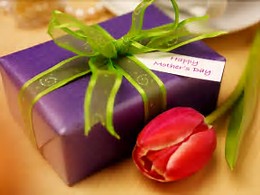 Despite fears of sounding
callous, I felt compelled to respond. “My mother has been gone
for some 8 years now,” I wrote, “and I still miss her every day. But the first Mother’s Day that I spent
without her, despite the onslaught of media messages, I must confess that, amid the pain, I also managed to find a bright side. For the first time in my life, I got to
be the one in the family being celebrated. I got to be The Mom!” Thank
g-d for her beautiful daughters, I added. “You (and they) have much to celebrate this Sunday. You are The Mom now too!” What I did not tell her (which truly would
have risked sounding callous) was how stressful I had always found Mother’s
Day, up until the year that my mother died. I invariably bent myself into a pretzel during the weeks before, trying to make plans that would please my mother,and to select
suitable gifts. This customarily involved spending hours at the mall, making brunch reservations, and buying tickets to a Broadway matinee, then driving hours to pick my mother up in Westchester en route to NYC, making sure that everyone in the
younger generation showed up on time to see Grandma Bunnie. 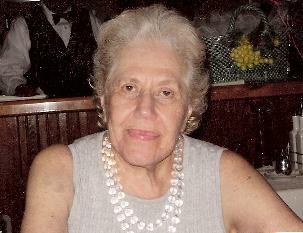 And even though Grandma Bunnie seemed to appreciate my efforts, some facet of the plans was all but guaranteed to go awry. Mother’s
Day traffic was bound to be brutal in both directions. My mother was almost
guaranteed to later return all the gifts I had so carefully chosen for her. So by the time I got
home from the festivities, I would be ready to collapse – never mind that I was the only one in the family still actively engaged in daily mothering, the one who had really needed a little appreciation, and maybe even a break.
So despite all the trouble I’d gone to, I would end up feeling inadequate and inept. But old habits die hard, as they say, and even though I
lost my mother some eight years ago, I have
continued to go to exhaustive lengths each year to make all of the plans for my family’s Mother’s Day. Never
mind that I am now, yes, The Mom. But this year turned out to be different.  Oh, I tried to make the plans, as usual. I was fully prepared to make them all. But somehow, for the first time ever, all of the plans I tried to make managed to get pre-empted. Would the day still turn out all right – which is to say, as good
as it ever does, considering that by the end I always tend to feel
like I’ve turned myself into a pretzel?
That remained to be seen. Continuing our long-standing tradition
of taking in a matinee performance in NYC, I first set out to select a show that everyone in the family might enjoy. 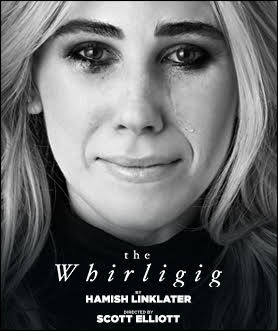 My first choice was a play being staged by a theater company to which I belong, The New Group. This play, called The Whirligig, was still in previews, but sounded awfully appealling. After
all, its cast included Zosia Mamet and Norbert Leo Butz. Zosia had portrayed
what was arguably my favorite character in the recently wrapped-up Lena Dunham series on HBO, Girls, on which she played the hyper, fast-talking, and unmistakably Jewish member of the quartet of friends, Shoshanna Shapiro.
And Norbert Leo Butz is,
well, excellent in everything he does. No ifs, ands, or buts.  But there was a “but” in this
case. An inconvenient one. There were six members of our family, including
my husband, our two children, and each of their significant others. And there weren’t six tickets left to The
Whirligig’s Sunday
matinee. So I decided
to book two seats for the night before instead, just for my hubby and me. Then I set out to get tickets for the
entire group for A Doll’s House Part 2 instead. A Doll’s House Part 2 had garnered great reviews and was being touted as the most nominated play of the year, having received eight Tonys nominations, including best play, best actress, best actor, best director, and two best actresses in featured
roles. 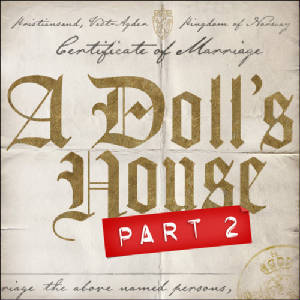 “So endlessly stimulating that it could give audiences fodder for heated
conversation until the fall season is in full swing,” raved Charles Isherwood in Broadway News.
What could be bad? How
about this? For one thing, the young reporter who reviews plays for the Connecticut newspaper
at which my husband works had given it a rather tepid rating. For another, my husband argued that he had never seen A Doll’s House, the original classic play by Henrik Ibsen, to which this one was meant to serve as a sort of
sequel. How could he possibly enjoy A Doll’s House Part 2 until he took in A Doll’s House 1? I was just about ready to throw in the towel when he proposed an alternative.
A revival of a 1932 drawing room comedy, The Roundabout, had just opened at 59E59, a theater company to which my
husband belongs, and it was
getting raves as well. 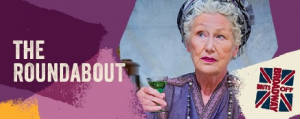 “A sparkling, impeccably staged play,” The
New York Times declared, going on to call it “catnip to Downton Abbey devotees!”
I was an unquestionable, dyed-in-the-good-British-wool, Downton Abbey devotee. What could possibly be better than that? I will tell you what could be better: The fact that my husband was volunteering
to buy the tickets himself, at a member discount, no less. I only hesitated for a moment when I learned
that our son would be unable to join us. Aidan, who is getting his Ph.D. at Columbia,
needed to study that afternoon because part one of his all-important oral exams began the very next day. (For those of you who may be unfamiliar with oral exams, these evidently have two parts, just
like Ibsen’s play. And part one of “the orals” was actually a written exam held over two days. Who knew?)  But Aidan assured me that he didn’t
mind our going without him, and his wife Kaitlin said she would be happy to join us to give him time alone in their apartment
to study. Plus, at
the very least, Aidan said he would definitely be able to join us for brunch.
Assuming that he needed all the time he could get to study,
I offered to find a restaurant in their neighborhood on the Upper West Side. That was fine, Aidan said. With one proviso: They
wanted to find the place and make reservations themselves.
I had always made the brunch reservations, never mind that it was Mother’s Day. OK, maybe I’m a control freak. The last time I suspected my husband was throwing me a surprise party, for my 40th birthday a couple of decades or so ago, I not only chose the caterer, but also made the guest list myself. Wait. Am I a bit of a control freak? No, no, that’s
not me. I don’t think it’s me. I don’t think I even like to be in control. It’s just that I don’t like chaos. I like
things to go smoothly, without a hitch, if possible. And the best way to make sure that things go without a hitch, I have learned, is to make all the plans myself. Though, yes,
maybe that does mean I’m a bit of a control freak. 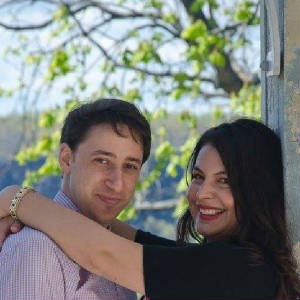 So I have a little confession
to make: I did continue to
look at eateries in their neighborhood, noting that, as the day approached, all of them were filling up for brunch. But I appreciated my son and daughter-in-law offering
to take control of the day instead. So I bit my tongue and kept quiet, knowing that they were moving into a new apartment that week, and that Mother’s Day
brunch might be about the last thing on their minds. And when they emailed me late that week to say that everywhere seemed to be filled up for Mother’s Day, I shrugged and just took it in stride, control
freak though I may be. And soon enough they managed to book a place at which
we’d eaten once before. It was nearby
and perfectly fine. Besides, where we went didn’t matter. It was all about who I would be with – my kids. So the
only things I got to make reservations for myself were dinner on Saturday, followed by the play with Zosia Mamet
and Norbert Leo Butz. Neither of which went as planned. 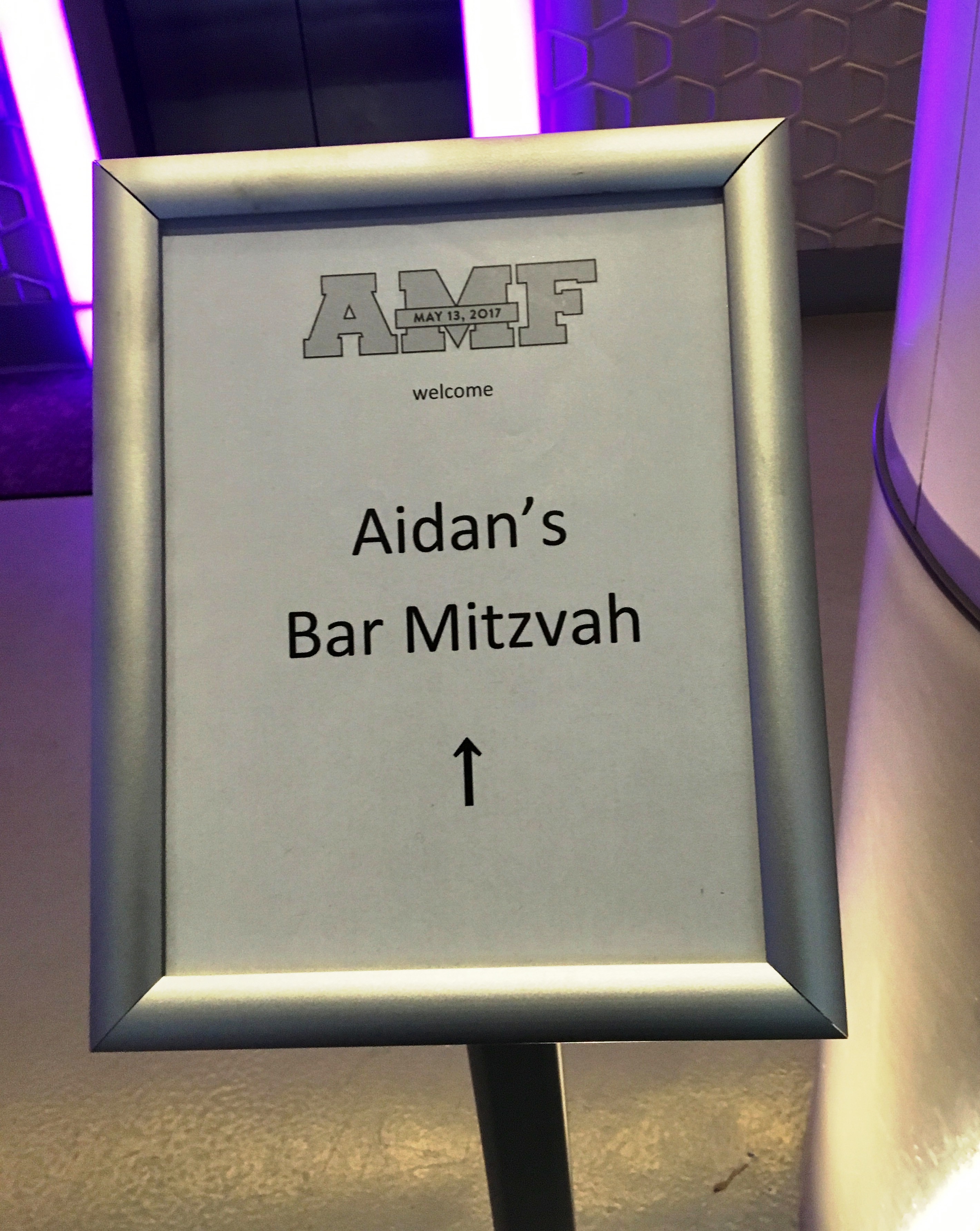 Late that afternoon, I received
a message from the restaurant, an Israeli eatery called The Green Fig I had booked online, saying there had
been a terrible mistake. They had a private event that night and were unable to honor my reservation. However, if we were willing to sit in their lounge instead of the dining room, they would give us a free bottle of wine. The private event turned out to be Aidan’s Bar Mitzvah, according to a sign in the lobby. LOL! We had attended our own son Aidan’s
bar mitzvah some 18 years ago, followed by his wedding last summer. No
matter. The lounge area was fine, the Israeli
food and the service were more than fine, and the wine was not just fine, but free!  The play, however, was something else. Zosia Mamet was more than fine.
So was Norbert Leo Butz, no
ifs, ands, or buts. The acting, in fact, was almost uniformly superb. The problem was the subject matter. The Whirligig started off with two distraught parents sitting beside their grown daughter’s bed
in a hospital and being told by the
doctor to take their 20-something child home.
There was nothing more that could be
done for her. She was going to die. 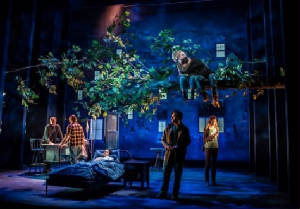 Having spent the entirety of this past fall sitting beside my own bed-ridden
20-something daughter, fearing that she
might never recover from the terrible concussion she had sustained, I found the entire production difficult to sit through. Never mind the frequent moments of insight and laugh-out-loud humor. Mother’s
Day entertainment it was not. Thank G-d we had been unable to get
in the next day. 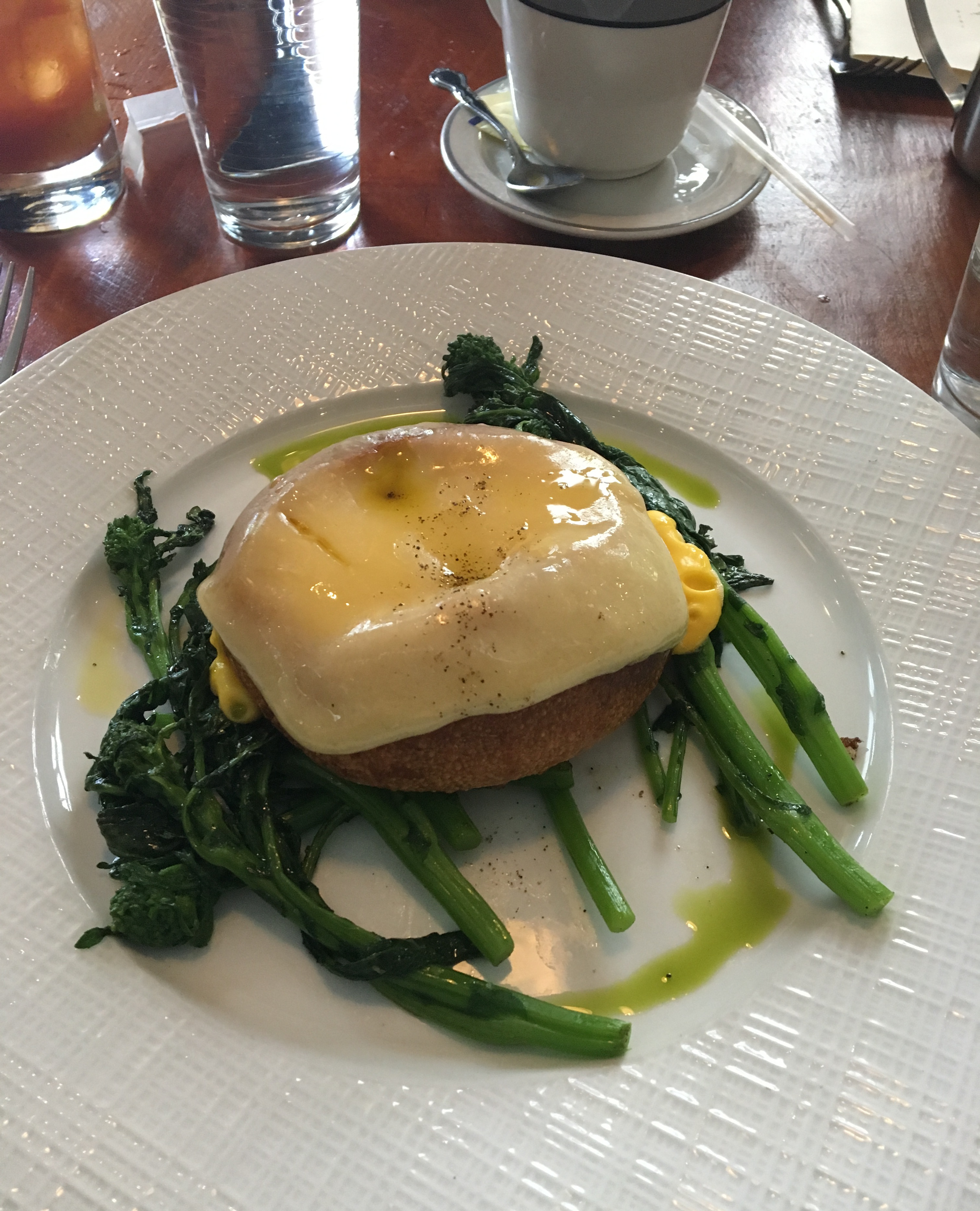 Brunch the next day, on the contrary, was perfect, though. Beyond perfect because everyone was there. On time, no less. The food was fabulous, the company even better. My only reservation had nothing to do with my not getting to make the reservations. It was just
that my son was visibly edgy in anticipation of his exam. And my daughter was also edgy because she works at a school and
was facing a very busy few weeks of year-end activities. Who came up with the idea
of holding Mother’s Day in the middle of May? How can any mother relax when her children are feeling anxious? I become
instantly anxious by association. Doesn’t every mother – nice, Jewish, and otherwise – when her kids are
in distress? But counteracting any sense of malaise was the bounty of
lovely gifts and cards.  I had told my kids there was no need to buy me any gifts, that a nice card would do. In fact, if they didn’t have time to buy a nice card, just a nice note
scrawled on a napkin would do. OK, in the
interests of full disclosure, I wanted a card, or just a note scrawled on a napkin, and one other little thing that related
to the tenure of the current presidential administration, if possible.  But no. Aidan and Kaitlin gave me a
gorgeous bag full of goodies, including a Starbucks to-go cup in my favorite color, aquamarine, along with an assortment of iced teas and delectable-looking goodies. But even better were
the sentiments on the exquisite card. “Thanks for always
being there for me, when I’m up and when I’m down,”
Aidan wrote. “And for planning one heck of a wedding. Happy Mother’s Day!”
Kaitlin, meanwhile, made me feel like I must be doing something right, control freak though I may be. 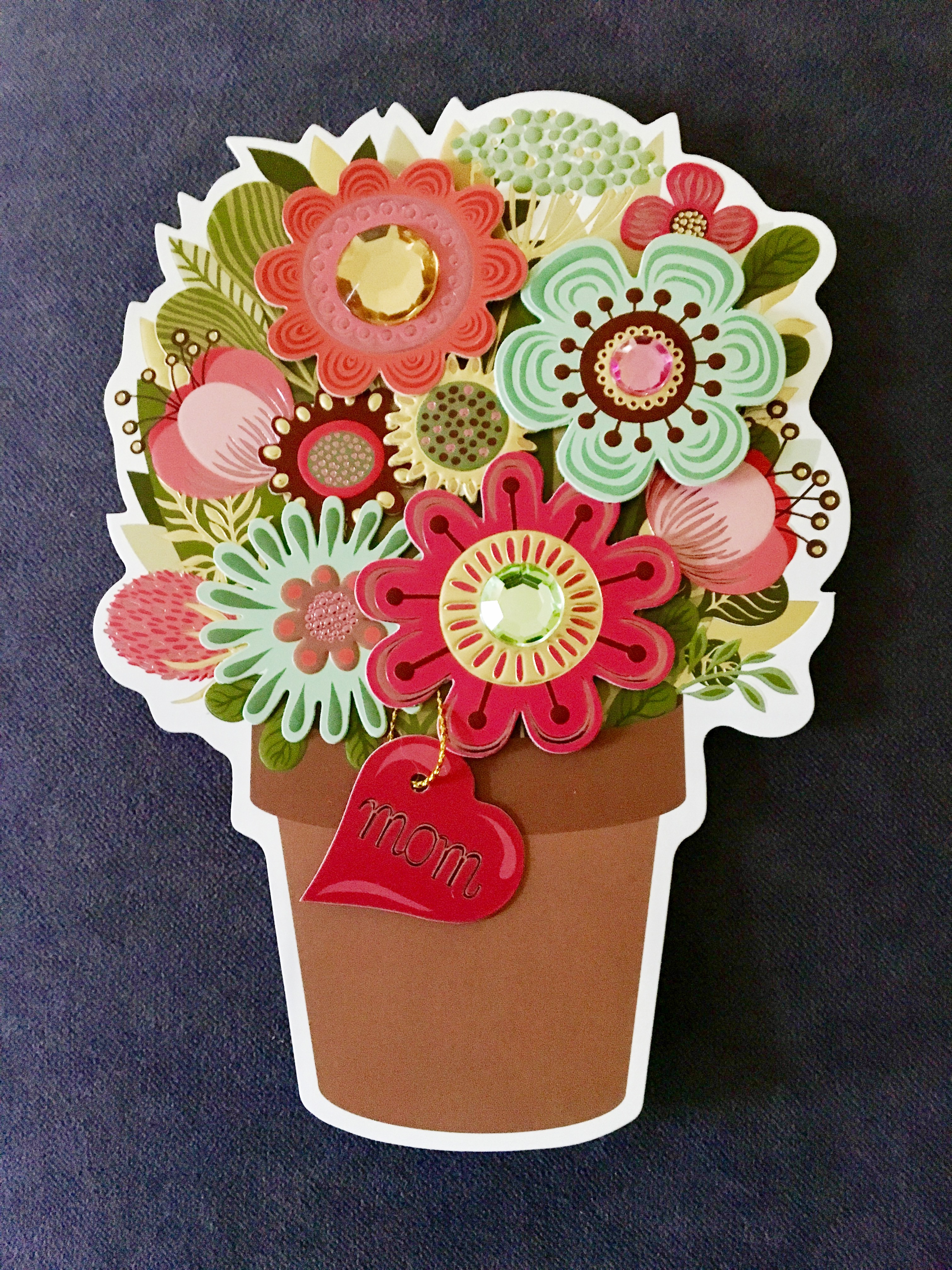 “I’m so grateful to have you as my mother-in-law!” she had
inscribed. “You are such a wonderful mom, writer, wife, friend and person. Thank you for making me feel so welcome as
part of your family!” Boy! I would have settled for any one of
the above attributes… just scribbled on a napkin. Allegra and her boyfriend JP, meanwhile, presented me with a true novelty,
an adorable umbrella shaped like my favorite thing in the world, a flamingo, along with
a little box of Mother’s Day chocolates that were far too beautiful to possibly eat. 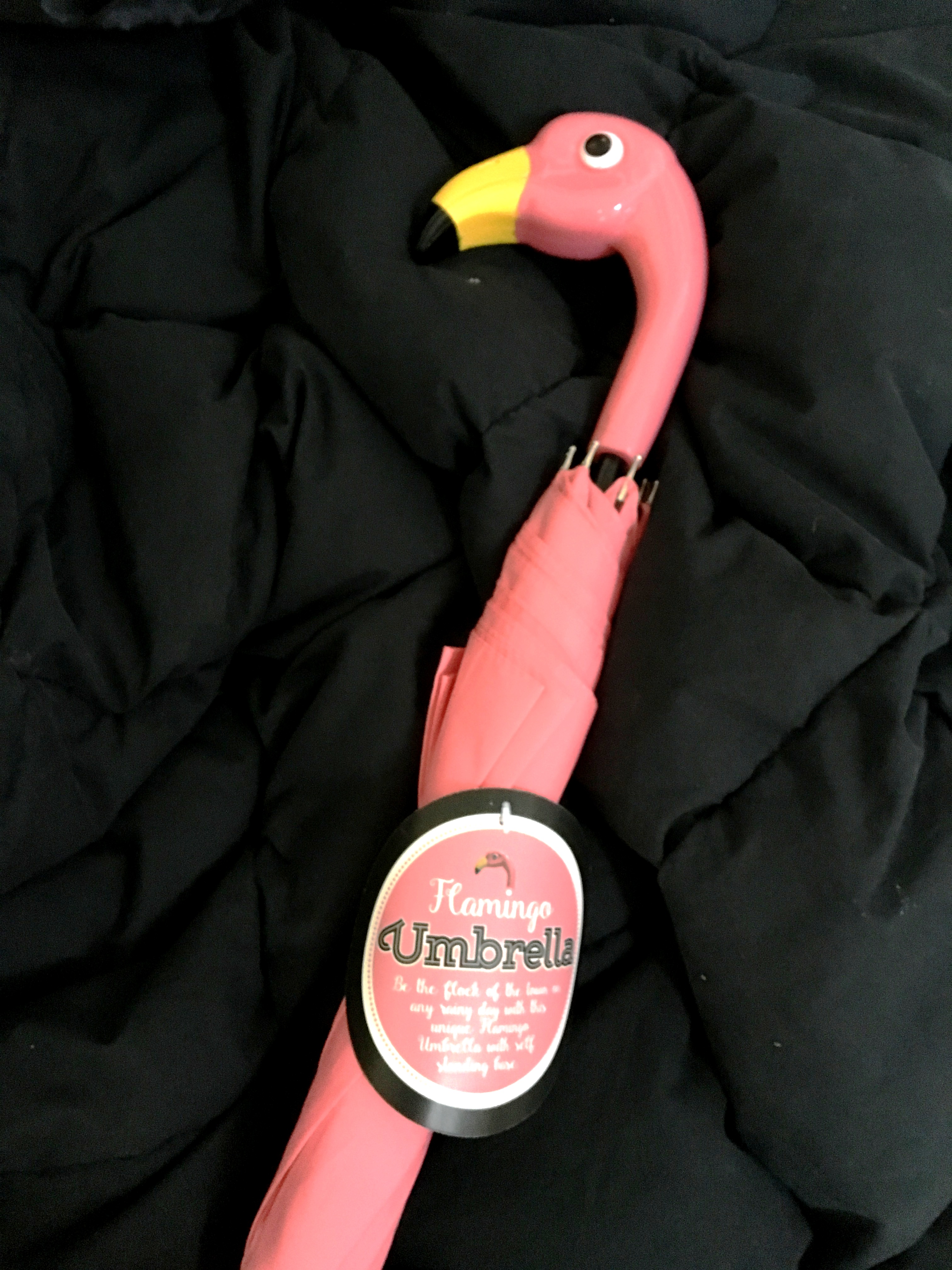 “OK. So maybe I call a little too much,” Allegra acknowledged on
their card. “But that is just
a testament to how much I love you. Not everyone can say their mom is their best friend, and manager, and editor, and stylist,
and… I could go on forever. But I can’t ever begin to thank
you enough.”  Wow! I mean, really. She had me at “maybe I call a little too much,” although if you ask me, when it comes to
calling your mother, too much is never enough. What was more than enough
was that delightful play we saw afterwards. The Downton Abbey-style one, written by J.B. Priestley. Go see it, if you possibly can. It’s playing for a
few more weeks.  My only real reservation
about the day occurred when we were saying goodbye. Allegra seemed so edgy that I couldn’t help asking if she was OK.
Even if she faced end-of-the-year pressures at school, wouldn’t they be over soon?
It wasn’t just that, she hastened to explain. It was the enormous pressure she felt. Pressure about Mother’s
Day. “How can you ever do enough for the person you will never be able to
thank enough?” she asked, sounding genuinely distraught. Oh. My. G-d. 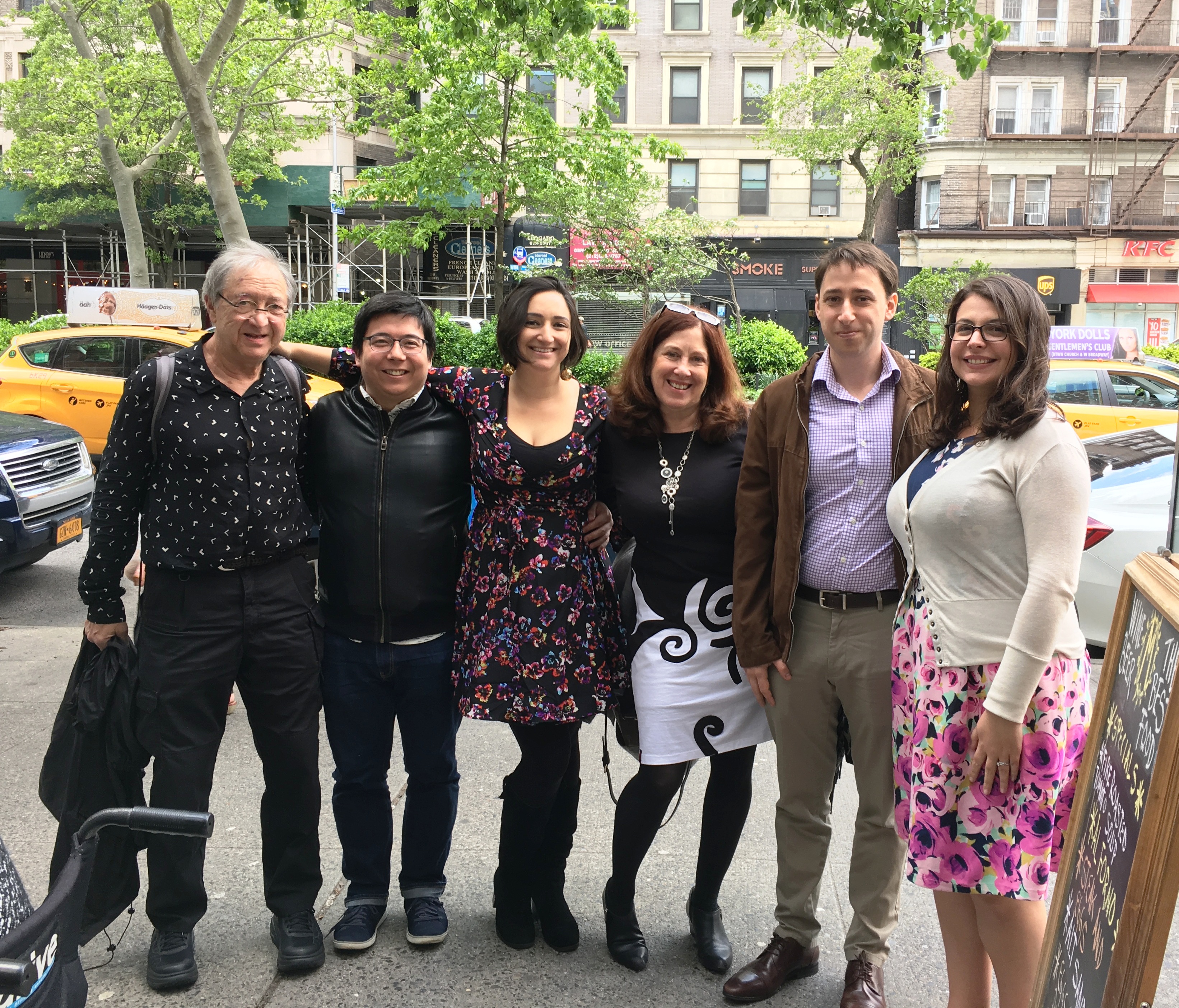 So I told her about how I
had always felt about my own mother and Mother’s Day. Was it a universal dilemma? Would this insane form of performance
anxiety never, ever end? “Please don’t say that!”
I begged her. “Everything you do is good enough for me!” The truth was that I didn’t need presents, or a nice card.
Not even a note on a napkin. The
only thing that was important to me was that we all got to be together. One week later, I’m happy to report that Aidan did fine on the written part of his “orals.” And
Allegra is now one week closer to being
in the final stretch of school. So my nerves have settled down, too. But maybe I should go back to making all the Mother’s Day plans. Then everyone else can relax,
and this holiday – as Jewish as it may be – can be celebrated guilt-free.
Mother's Day, after all, is for mothers. And hey -- nice, Jewish, or otherwise -- I'm The Mom.
Saturday, May 13, 2017
A Word From The Weiss 
Happy Mother's Day to all of you mothers -- nice, Jewish, and all the others.
I am looking forward to spending a wet yet wonderful weekend in NYC visiting my children and their so-called significant others.
Hope you have someone to spend it with too. If you see something, say
something. Or so they say these days. Well, yesterday I saw something. Not a potential sign of terrorism or crime, but something
very disturbing. The question was, should I dare to say something? And if so, then what should I say? This
was not, I repeat, related to terrorism or national security in any way. Yet as
we are beginning to learn, suspicious or unsavory things can crop up almost anywhere. In
this case, it was the most unthreatening of settings. A flea market in Massachusetts. 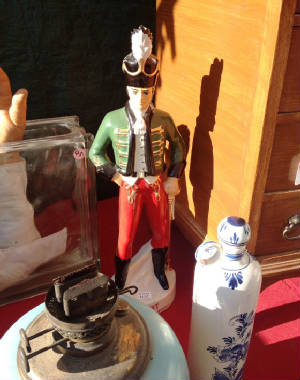 Well, not just any flea market. I am talking about Brimfield, the largest and easily best-known outdoor antiques and collectibles show in the entire country. Maybe world. This annual event, which happens three times a year – for six days straight in mid-May, July,
and early September – began in the 1950s and now attracts over 5,000 dealers and tens of thousands of visitors from
all over the country and planet. Between the crowds, the crazy and often vibrantly colorful hodgepodge of stuff being sold, the rows of white tents, and
the lively food court, this event takes on a
kooky, carnival atmosphere. This place is not just a three-ring circus. It’s more like 3,000 rings. I first discovered it through my cousin Susan, arguably its most devoted devotee. We have made an annual excursion there since ever I can remember, sometimes two or even three
times a year. My house overflows with the tchotchkes I’ve brought back, treasures I know that I didn’t
need, but couldn’t live without as soon as I had spied them. Some are so quirky that they give my house
something of a carnival atmosphere, too. 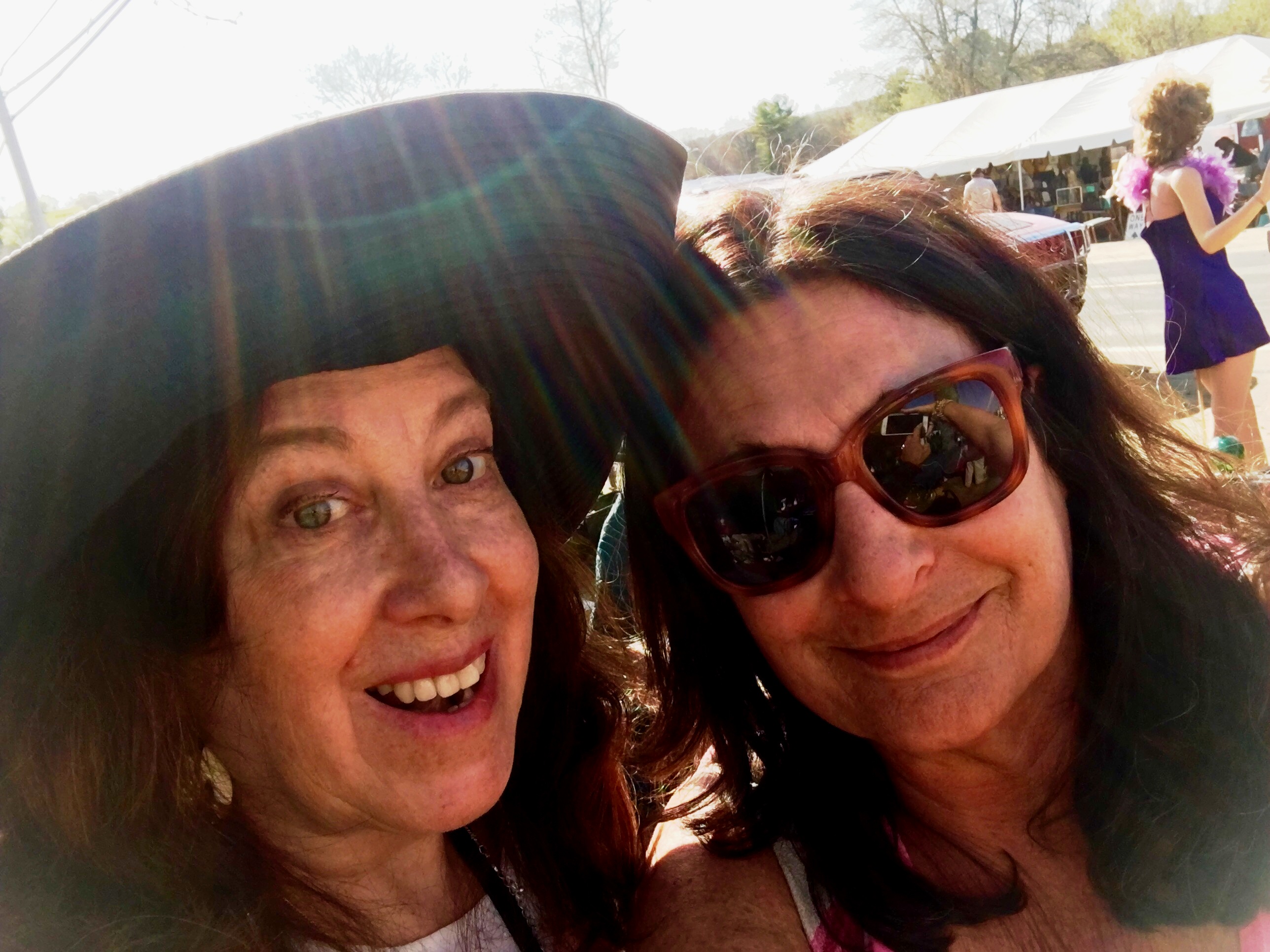 My cousin and I always looked forward to going there and would count down the days until we could each
spring, the way non-Jews tabulate the days until Christmas. When Susan chose to move from my town in Connecticut down to Florida last summer, I assumed that our Brimfield days were finally over. Last May, I had to fight back tears as we put our heads together there and snapped a selfie. I
figured it would be our last. But then, to my surprise and infinite delight,
she flew up last week for a visit. She came up
mostly to celebrate the 90th birthday of her mom, my ever-youthful Aunt Kay. But as luck would have it, this just happened
to coincide with the opening of Brimfield. 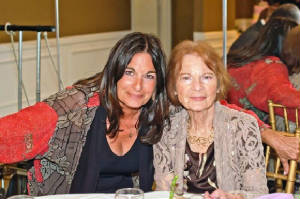 I picked her up on Wednesday morning, and before noon we were parked in a makeshift
lot on the grounds of a farm (albeit nearly a mile
away from the action) and already on the
prowl. Susan, who is the virtual queen of Brimfield, led me to a section of the market called Hertan’s, where a tent filled with used clothing had just opened up. Eager
buyers were being issued free lemon-yellow
tote bags at the tent’s entrance. A hand-lettered sign stated that as much as you could stuff into each bag would cost $20. The last thing I needed was more clothing, let alone other
people’s cast-off items
that I would have no opportunity to try on. But everyone began frantically sifting
through boxes and racks of garments, and caught up in the frenzy, I soon followed suit. Susan handed me a pair of wide-legged knit
pants with diamond-shaped designs at the hem. Whatever. Why not? 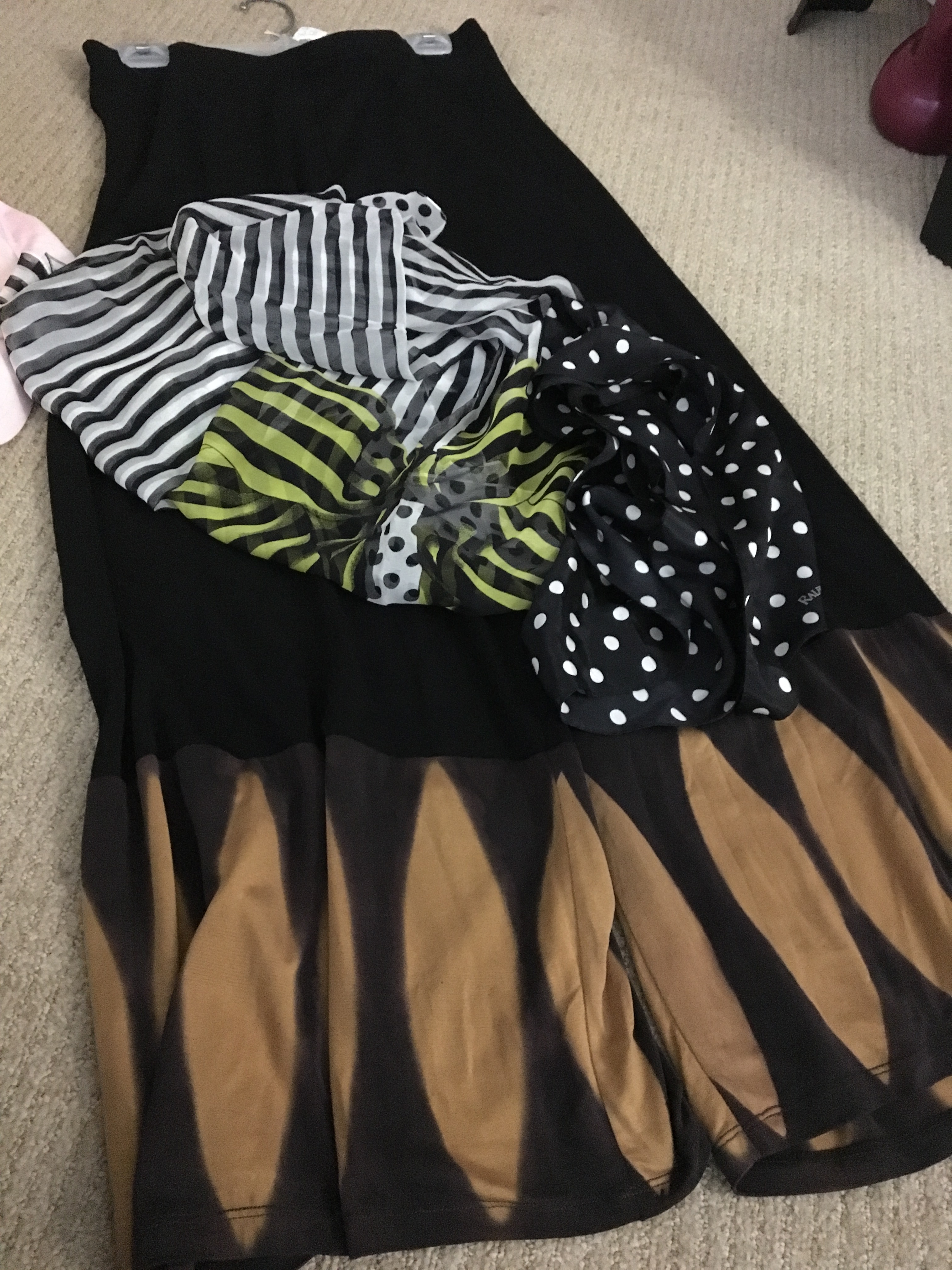 To these, I added two black-and-white silky scarves (one polka dot, one striped), an iridescent mauve dress my daughter might like,
a pale pink tennis hat embroidered with a “P” (not for Pattie, but evidently
the Portsmouth Regional Hospital) and an Italian black blazer with a single big white button at the belly. Never mind that it smelled a bit musty. When all of this failed to fill my
bag even halfway, I threw in a large white tablecloth heavily embroidered with lace. Never mind that it might have a few faint yellow stains. During a single Passover seder, it might sustain
so many battle scars from beet-red horseradish drippings and Manischewitz that I might need to throw it out, anyway. At an adjoining tent, I assembled a small collection of old earrings and bracelets. “How
much?” I asked the man stationed at the entrance. He surveyed my bits of unburied treasure and shrugged. “Five bucks for the lot.” We had been there for 20 minutes and I was already lugging around a heavy load. The walk back
to the car would be endless, and we still had many hours left to shop. Savvier patrons had arrived equipped
with folding carts in which to transport their finds. I would have to be more
selective.  As I acknowledged earlier,
I didn’t truly need anything. But “need” is a subjective term. Once, I shelled out 60 bucks for an Art Nouveau flower
frog in the shape of a nude posed gracefully on a crescent moon. Never mind that until that moment I hadn’t known what
a flower frog was. It was exquisite, and
it had been marked $125. What a bargain! The following year, I had bought a companion flower frog featuring a similar nude. Never mind that it set me back another 40 bucks (down from 45). Now I was a collector!
To ward off other such impulse buys, I had found that it helped to arrive at Brimfield with some sort of mission
in mind. That meant thinking of something funky I could use. Not something I needed, necessarily
(see paragraph above), but that might serve some purpose. Or, better yet, something
that one of my children could use. Over the years, I had bought them each a vintage coat rack or two. Neither child felt they needed a coatrack. But the racks remain in their apartments, so covered with coats that they can't be
seen. People keep telling me that young people today don’t want a bunch of old stuff. Mine may not want it, but
I say they need it, because my gifts are being put to good use. My son and daughter-in-law, meanwhile, had just moved into a brand new apartment
last week. Their new apartment was much larger than their old apartment. (That’s the main reason they moved there.) But I didn’t dare ask them if they needed anything from Brimfield. They were having enough
trouble transporting all of their
own old stuff to their new place. They didn’t need to deal with anyone else’s old stuff now. 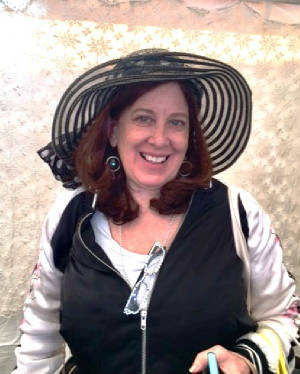 My daughter also moved into a new apartment this winter. Knowing that I was going to Brimfield, and being too busy to join me, she had told me she did need something. The kitchen in her New York City apartment is merely an alcove
with a stove and a sink
– so small that it doesn’t have a single drawer in which to store flatware or plastic wrap. She
wanted a piece of furniture to station outside this nook, one with plenty of drawers.
I promised to be on the
lookout, although I doubted I could fit any furniture in my car. This would give
some purpose to my travels. But I also had an agenda of my own.
Years ago, I’d bought a beautiful vintage hatpin at the Brimfield market. Hatpins may be a thing of the past, but they
represent an ever-present need to me. As a fair-skinned person who shuns the sun,
I wear broad-brimmed hats throughout the summer. Each of these is embellished with a hatpin. 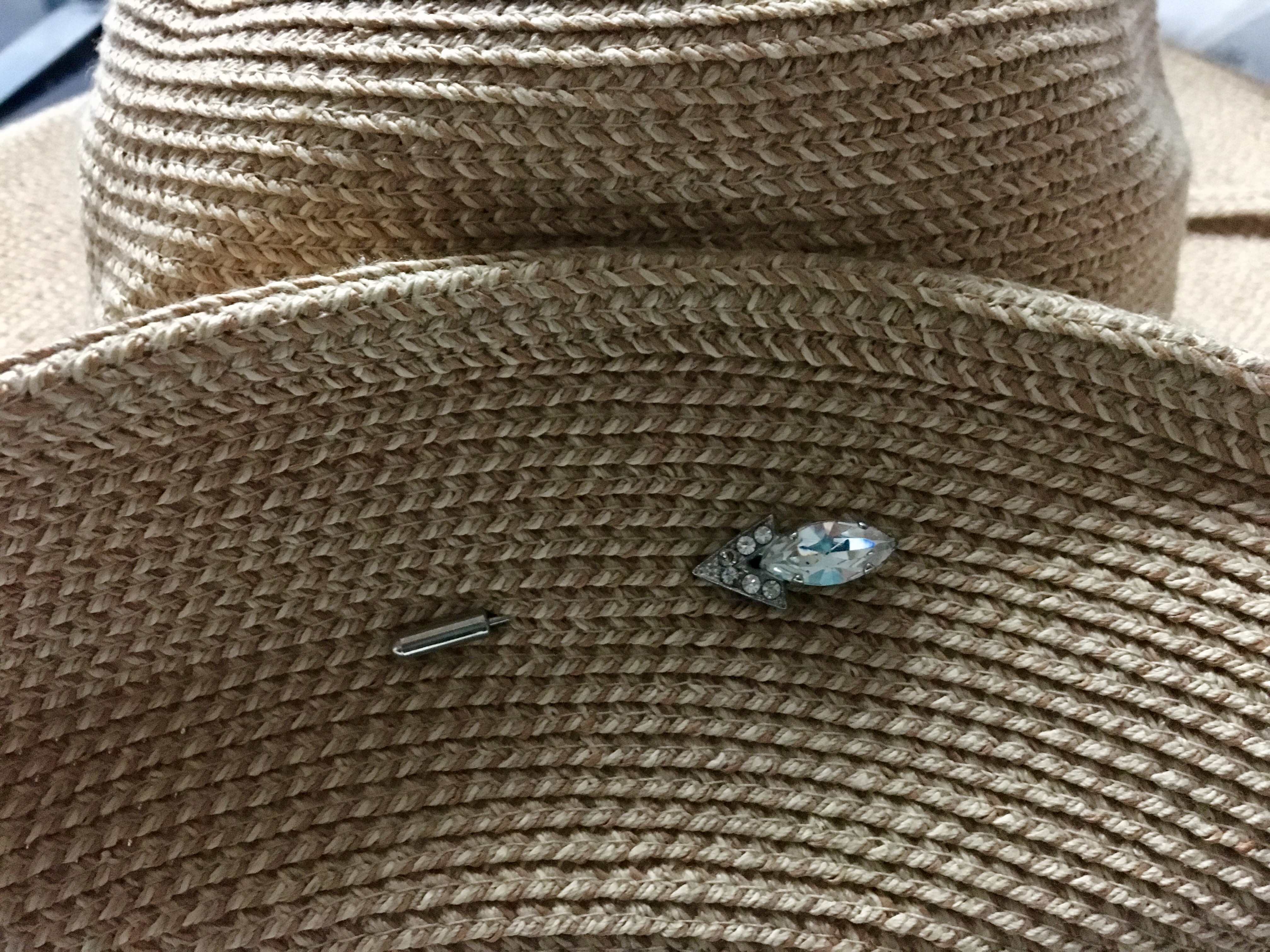 It isn’t just a matter of adding decoration, although there’s nothing wrong
with that. These stick pins actually
serve a purpose. They prevent my hats from blowing away on the beach or being wafted off by a sudden breeze. I imagine that in Victorian times, women plunged these hatpins through the massive buns or twisted braids on their heads. In medieval Europe, they were also employed to hold wimples on women’s heads.
What, you may wonder, is a wimple? It’s a
large piece of cloth that covers the head, neck, and chin. In medieval times, it was improper for married women to show their hair in
public, just as many Orthodox Jewish wives choose to keep their hair covered now. These days, wimples
are worn only by nuns.  I don’t
go in much for Victorian hairstyles. And I’m a nice Jewish mom, not a nun. But I have enough hair to plunge a hatpin through and don’t want my hats to blow
away. As I recounted in this
space last summer, I made a terrible mistake with my favorite hatpin. I was about to fly back from Paris when it caught the attention of a security guard at the airport. This fellow summoned a
small army of reinforcements, including the security manager. She removed my hatpin from my
hat, touched the sharp tip, and shook her head in palpable disapproval, a level of disdain that was decidedly
French. “C’est un antique!” I pleaded plaintively, using my best rusty high school French. “C’est un
bijou!” (“It’s an antique!
It’s a jewel!”) At this, the stern, uniformed woman shook her head and replied in her best English.
“Madame, eez forbidden!” Then she coldly tossed my precious hatpin into the trash. Ever since, I had been counting the days until I could return to Brimfield for another. Now, at
last, was my chance. 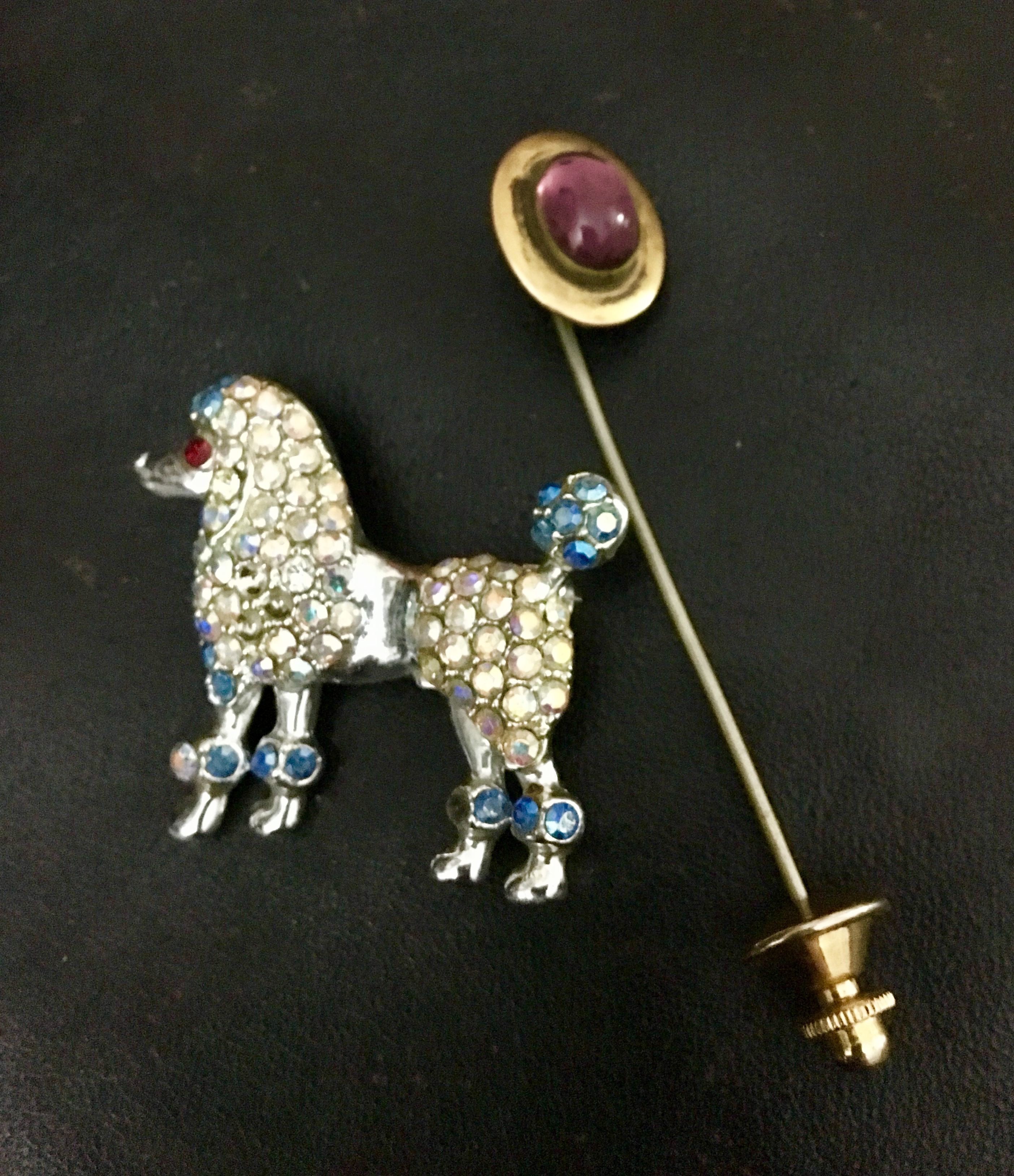 I spent a long time at one booth foraging in boxes of old jewelry, then deliberating over whether to purchase a
poodle brooch encrusted in rhinestones or a tarnished stick pin with a purple
jewel that was probably no amethyst. Then, suddenly, my cousin waved me over. In a neighboring
booth, she had stumbled upon a mother lode of much nicer options. Indeed, after paying $5 for each of the aforementioned items, I hurried over to see that she was
right. Perched atop a glass jewelry cabinet were two small vases (or possibly salt
shakers, given the pattern of tiny holes pierced in their tops). Both held a bouquet of a dozen or so hatpins, each one more beautiful than the last. 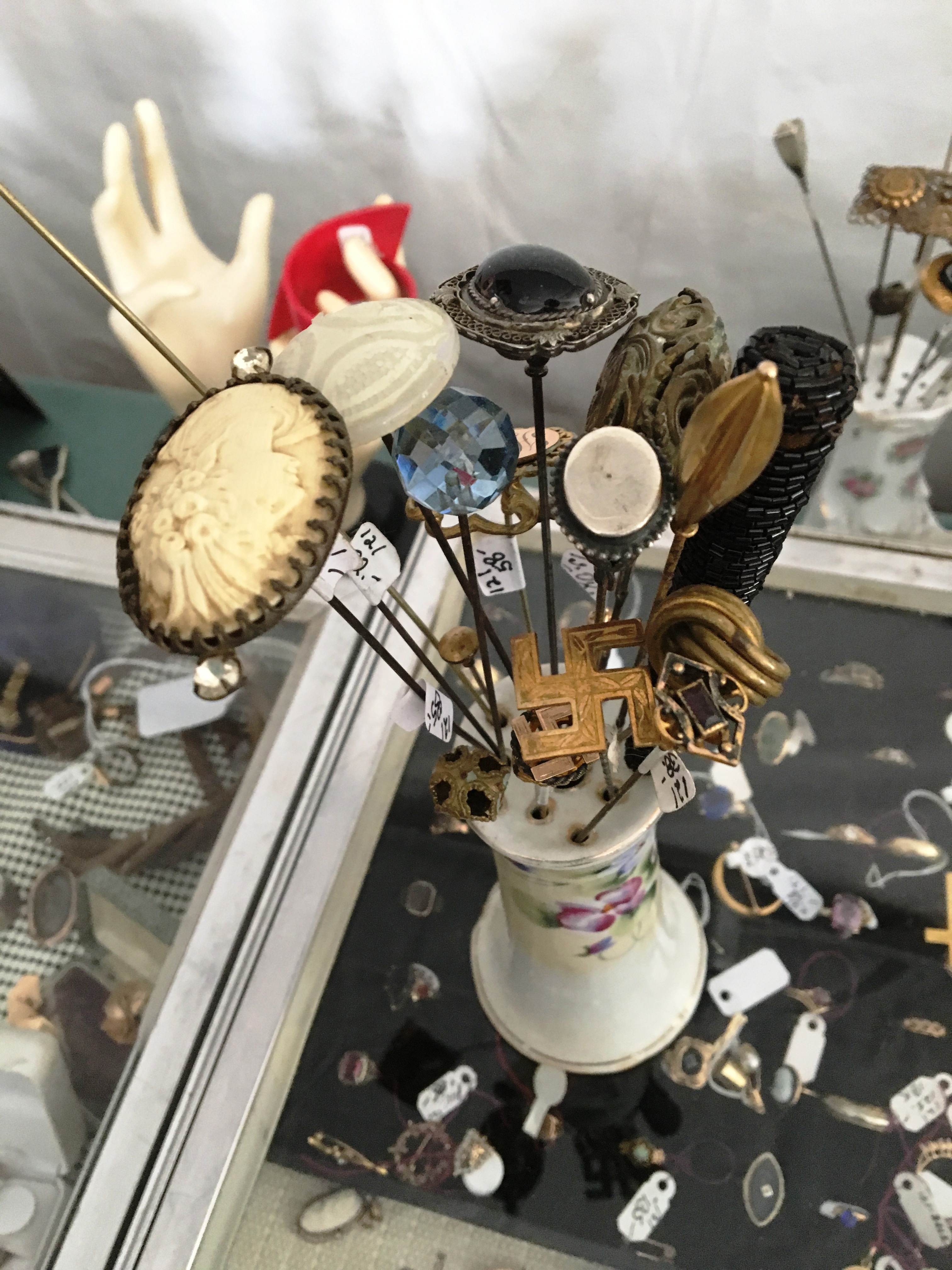 I began to pore over this collection,
trying to decide which of the pins I liked best. One featured an ivory-colored
cameo. Another had glittery black caviar beads wound around the tip like a turban. Then I noticed two others and stepped back, recoiling
in horror. The heads of these two
bronze-toned hatpins were shaped exactly like swastikas. Oh. My. G-d. Almost sick to my stomach, I backed out of the tent. Then I thought better of it and motioned to my cousin to come at once. I wanted to make sure that I wasn’t dreaming. That’s how hard I found
this to believe. In truth, this was hardly the first time I had encountered one of these Nazi symbols. It wasn’t even the first time I had encountered one at Brimfield.
Some people collect strange things, and some collectors tend to be strange people. There is no accounting for what many individuals
consider to be fit to collect. There are people who collect
airline barf bags, toenail clippings, and belly
button fluff. There are those who collect
empty Coke cans, umbrella sleeves, or talking clocks.
And whatever it is that people collect, vendors are happy sell it to them
at Brimfield. Well, maybe not toenail clippings or belly button fluff. But just
about everything else. The first time I’d
spied some Nazi memorabilia there nestled amid relics of WWII, I hadn’t hesitated to express my disgust to
the merchant selling it. He had reacted defensively, saying that there was a market for these items, so he didn’t see why he shouldn’t stock them. I had argued that this hardly an excuse.
There is a market for heroin.
Does that make it OK to sell it? It was sickening to capitalize on genocide,
in this case the savagely planned and executed extermination of millions of Jews and many others.
I was Jewish myself, I’d added, and although I’d seen something among his wares that I liked, I wouldn’t consider patronizing his
booth because of his deplorable choice.
At this, he had simply
shrugged. He simply didn’t care. The
encounter had upset me so much that I’d opted ever since to just give purveyors
of such evil items the evil eye, then stalk out. It was one thing to see Nazi insignias hidden amid guns and other war memorabilia, though, and quite another to view it displayed daintily alongside women’s jewelry. Ugh! 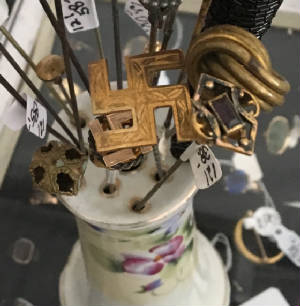 I had journeyed there to have a nice day with my cousin and pick up a few antiques, however. I was not there to pick arguments or stand up for my beliefs. But I am a nice Jewish mom, emphasis on “Jew” in this case. I couldn’t just
walk away. So I went to
find the merchant overseeing this tent, in
order to voice my distress. I was a little startled to discover that she was a small, attractively dressed woman of about my age. Not to cast any aspersions, but
to the best of my recollection the fellow I had reprimanded for selling the Nazi
souvenirs had been an old, Southern-sounding
codger with a long, straggly beard
that looked like it might house several small critters. Now, when I motioned toward the woman, she approached
me with a warm smile. “I
came in looking for a hatpin and was very
interested in buying one of yours,” I began, “until I noticed that you have a couple here shaped like swastikas.” Her smile didn’t
fade one iota as she looked at me cheerily and calmly replied, “Those aren’t swastikas. They’re peace symbols.” Say, what? “Peace symbols?” I repeated in disbelief. “Well, they
sure look like swastikas to me. And I must tell you that I find that very offensive.” She shook her head, not budging an inch. “They
make look like swastikas,” she allowed, “but that’s not what they are. They’re Native American peace symbols.” “Native American peace symbols,” I echoed. “Hmmm.
Really. Are you sure?” Looking
a little more closely, I detected that the larger of the two swastikas – or should I say peace symbols –was engraved with what appeared to be feathers. And feathers, as far as I knew, had never been commonly associated with the Nazi party.
They were more likely to be associated with Native Americans. But still. At that moment, I remembered an incident my daughter had told me about a few months earlier. A student at the school at which she works had drawn a swastika
on a desk. Nobody knew who had done it, but the faculty was up in arms – all except for one teacher, who had argued that this graffiti might
just be a Latvian peace symbol. Yeah, right. My daughter hadn’t made much headway arguing with that knucklehead, and I realized that
I probably wasn’t going to get
very far with this one, either. The best I could
do was to walk out without making a purchase and hope that this would speak volumes.
Of course, customers constantly walk out of tents at Brimfield and
stores everywhere without buying anything, so she might merely have assumed that I just wasn’t interested in her wares. So, as glad as I was to have said something in
this case, I continued to wonder for the
rest of the day. What could I have said instead? Had I said enough? Sure, I might have proceeded to lecture her about the evils and atrocities of the Holocaust. But the hubbub of this bustling flea market had seemed
like neither the time nor place. I also might have made it clearer that I was leaving only because I couldn’t
in good conscience do business with someone so lacking in compassion or common decency. Not to mention integrity. For even if it’s possible that those hatpins were peace symbols -- whether Native American, Latvian, Buddhist, or whatever the
heck else – the fact that they
were shaped exactly like 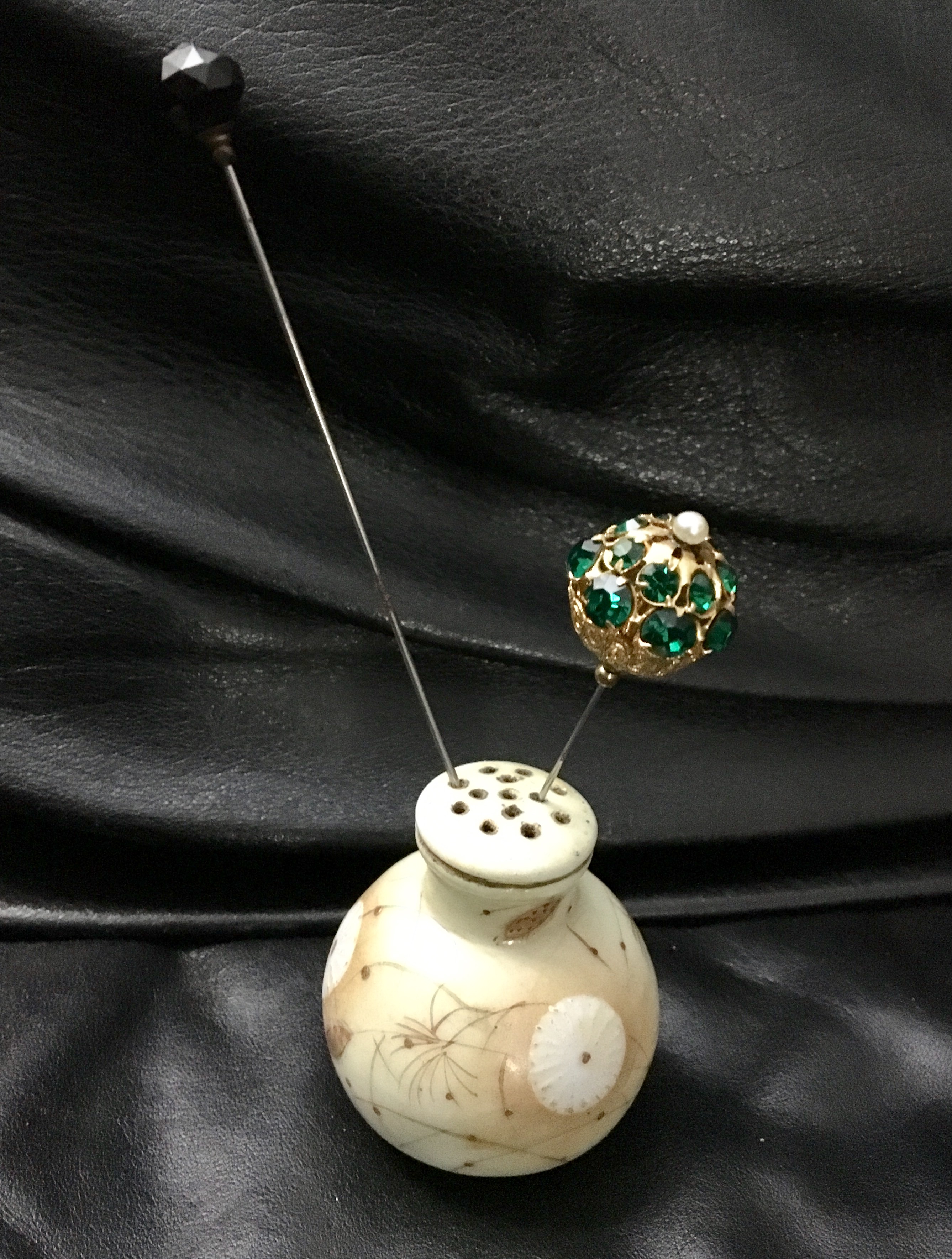 swastikas should have been enough to dissuade her from displaying them, or presumably buying them from someone else in the first place.  Yet I had come there to spend time with my cousin, and to enjoy
the scene, not to make one. And
we still had a whole lot of booths to visit. So
we merely exited quietly and walked on, and on, until I finally found a couple of hatpins for sale in another tent. These weren’t nearly as nice as the non-swastika ones being offered by the first lady. But one had some pretty green jewels,
and the other was black and sparkly. They were nice enough. They would do for now. And they were
each only 5 bucks.
Saturday, May 6, 2017
A Word From The Weiss 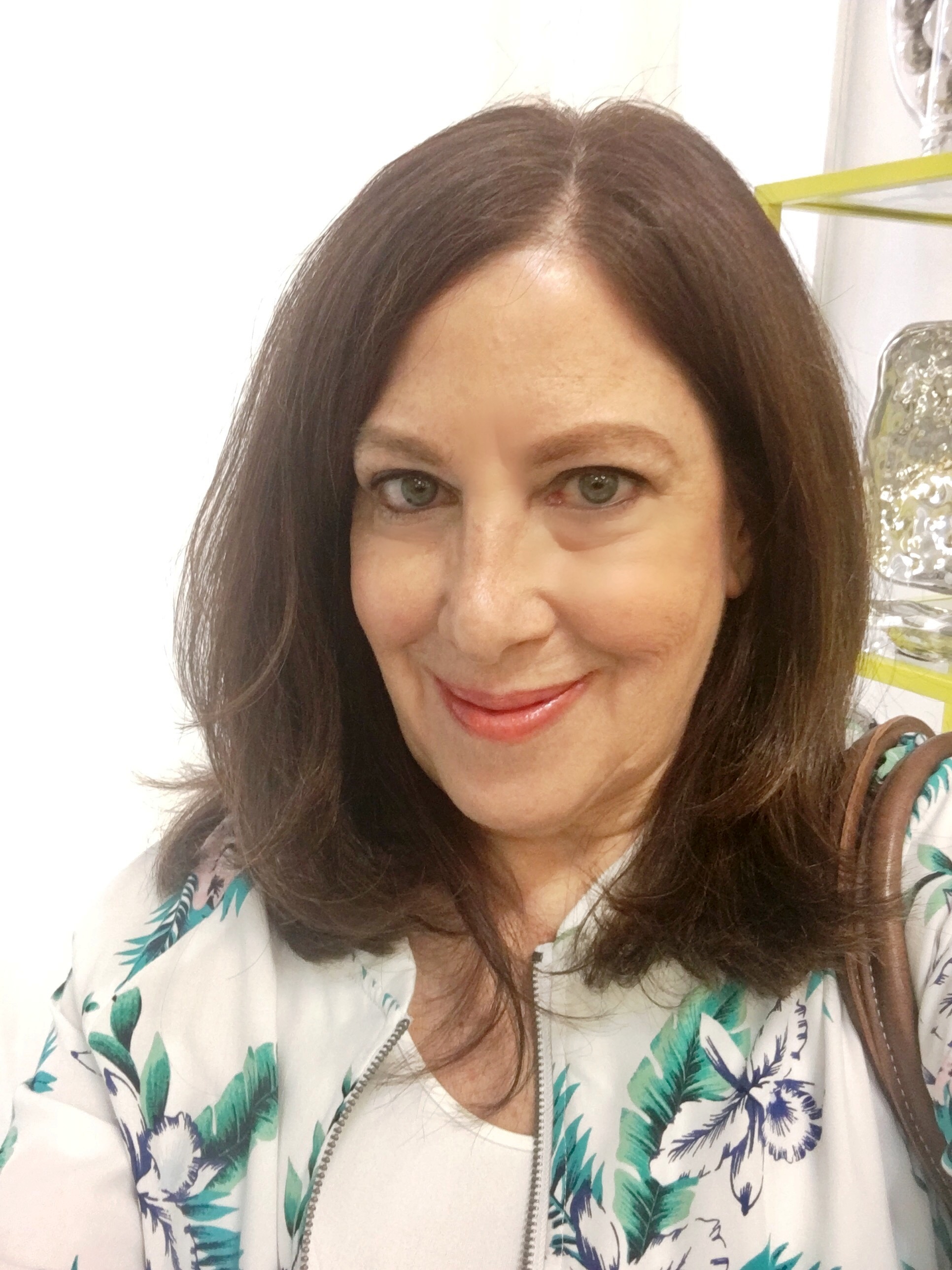 Early May may be a beautiful time of the year, but it’s also
a particularly busy one. Especially for those involved in the academic world, which happens to include my son, my daughter, my daughter-in-law, and enough of
my friends to nearly make up a minyan. For those of you who also may
be feeling a bit overwhelmed, all I can say is relax! You will get through this. Whatever “this” may be. You know you will. You always do. And then, soon enough, it will be summer. So even if you have no
time now to stop and smell the roses
(or the cherry blossoms, lilacs, rhododendron, or forsythia), just do your best, given the time that you have, and try to remember to breathe. Really breathe!  Life is busy. But busy is good.
Often, the best we can do is to keep moving forward.
As someone who gets mired in sentimentality and self-doubt, I have a tendency to get stuck instead. Stuck in mindsets, habits, relationships, and rituals,
nice, Jewish and otherwise. But I am proud to report that all of a sudden, in the past week
or so, I have found myself moving forward. At least I have managed to move forward with respect to my chosen method of moving forward – as well as north, south, east, west, and any other direction
in which I may wish to go. Long story short: I did it! Something I have
been putting off for a very long time. Not quite as long as the Jews wandered in the desert, but still pretty
long.
I finally bought a new car.
What's the big deal about that?
No doubt there are people out there buying new (or used) cars every single day of the
week. Not me. I am not a car person. That is to say, I'm not someone who particularly
cares about cars. Or status. Or having the status that people may feel driving a luxury car conveys. As long as I have something in my garage that is in road-worthy condition,
I'm fine. I prefer to save my money for better things, and I would rather be judged by far more substantive stuff than the
make and model of my means of transportation -- stuff like my character, my incredible kids, or even my cooking skills. (Have
I mentioned lately that I make a pretty mean matzo ball soup?)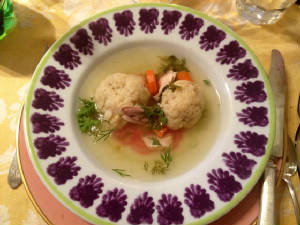 So never mind buying a
new (or used) car every few years. I don't even buy one every decade. So never mind buying a
new (or used) car every few years. I don't even buy one every decade.
In fact, it had been a
full 15 years since I purchased the car I was currently driving, a 2002 Toyota Avalon. 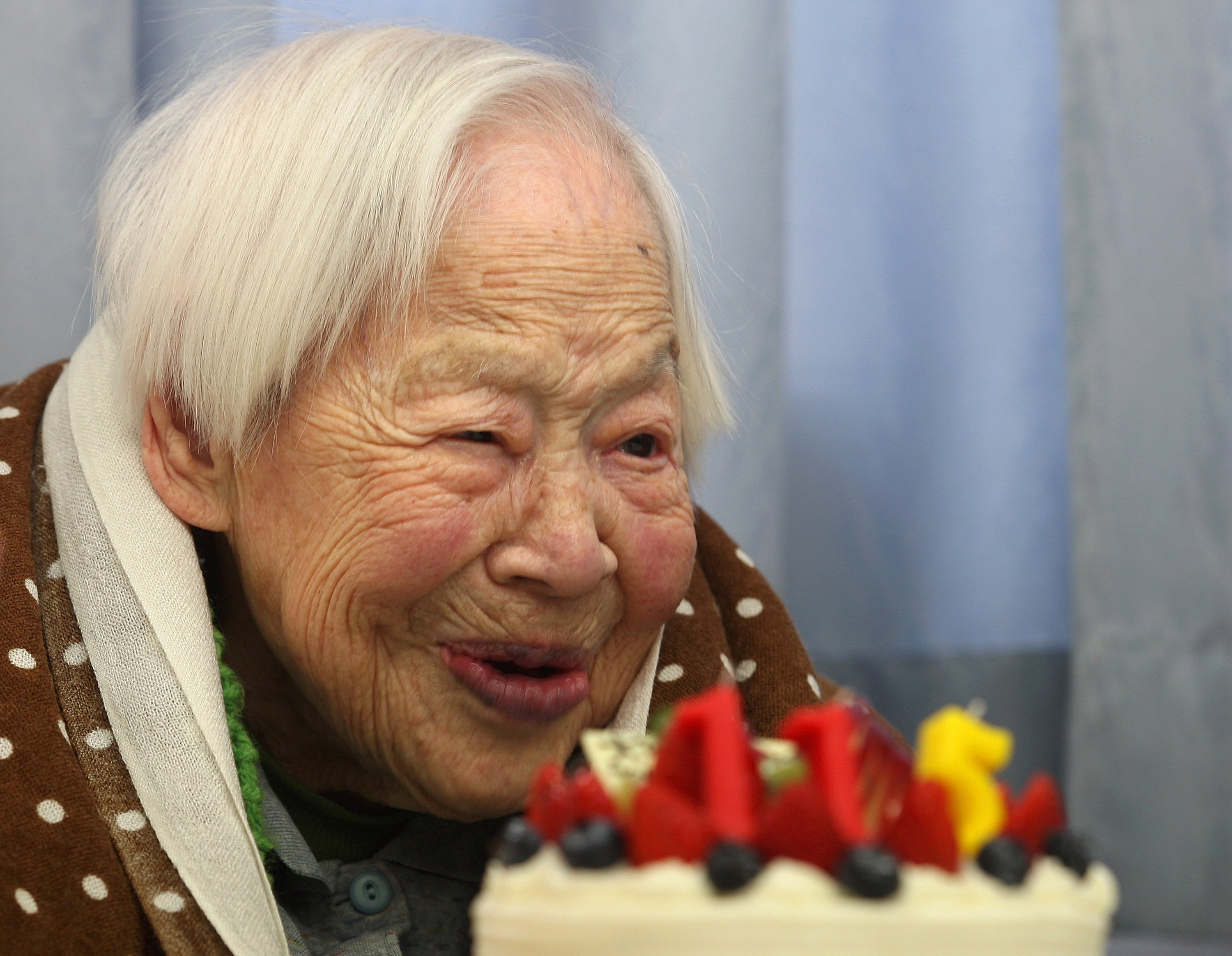 That, in fact, was the
problem. I don’t know what it is
about Japan and longevity – whether it be the people there or the cars they produce – but Toyotas are like the Okinawans of the car world. The island of Okinawa not only boasts the highest life expectancy in the world, but also the highest health
expectancy. Many people there live to surpass 100, and its inhabitants remain vigorous and disease-free well into old age. Similarly, Toyotas keep running and running. At least mine did... until last week. 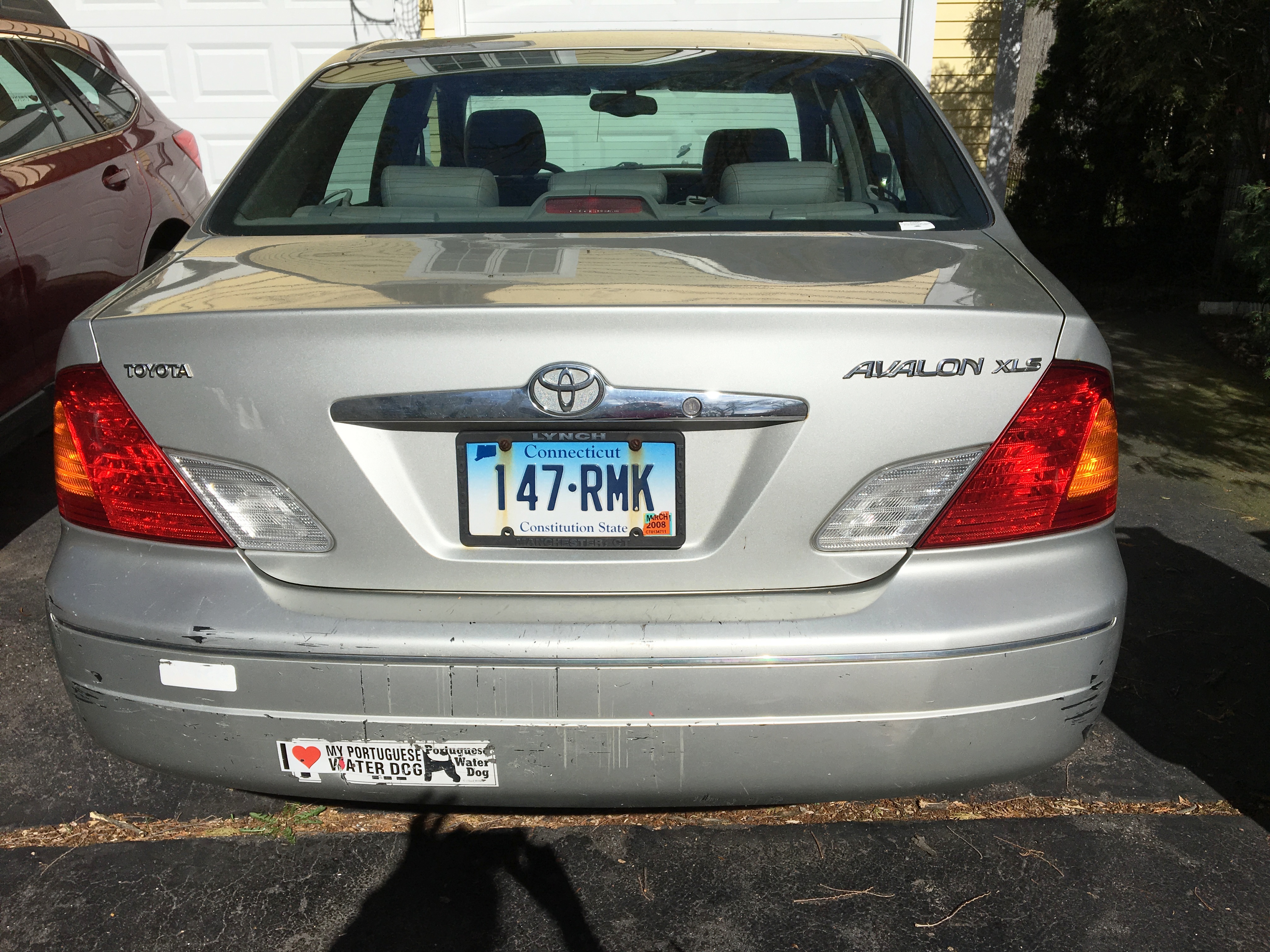 In fact, it would still be running –
and running – Energizer
Bunny-style if I had been willing to invest a few thousand dollars in new tires, an improved suspension, some kind of
hoochimacoochie belt, and various other repairs. But given its vintage and the very busy life it
had seen me through, that would have meant spending a few thousand dollars more than the car itself was worth. And so it was time to make a tough decision. And yes, a
tough decision it was. You might think I would have been fully satisfied that I
had already gotten my money’s worth out of this valiant vehicle, and then some. After all, during the 15 years I had
owned it I had been obliged to shell out little in the way of upkeep or repairs.
But Toyotas are supposed to be good for a good 200,000 miles, and so far mine had racked up only 146,000 of
them on its odometer. 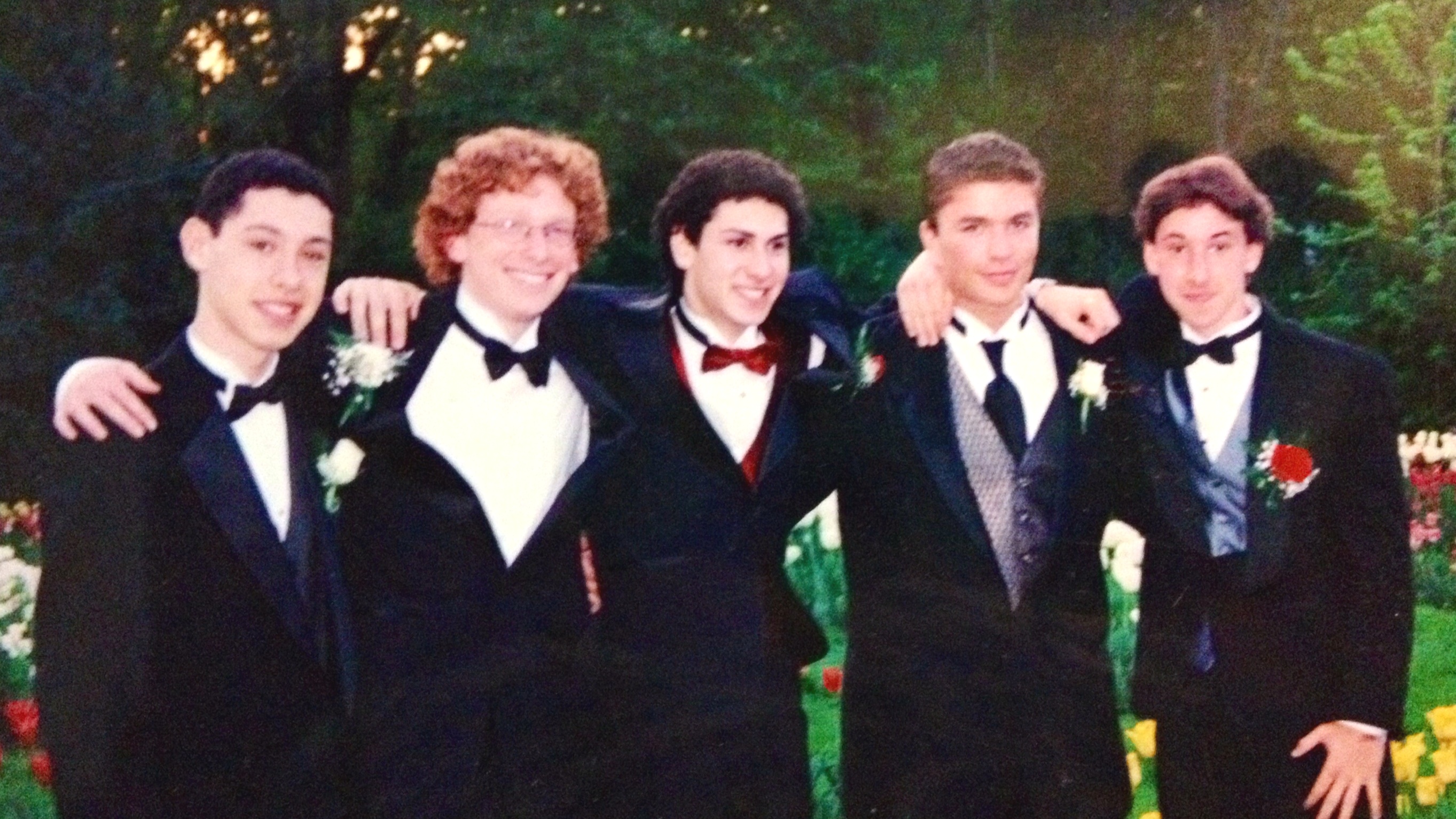 Far more significant, I am, as I said, a sentimental type. Make that very sentimental. My trusty Avalon had been
with me since my youngest child had entered middle
school. It had seen me through her bat mitzvah, years of carpooling, multiple junior and senior proms, two college graduations, and
my son’s wedding last summer. Was I really ready to cast it off now, just because it had (perhaps literally) hit a few bumps in the road?  Never mind that it had long ago begun to show its age. When you have two children, a busy life, and a dog who loves going along
for the ride, try as you might – and believe me, I've tried – you don’t have a prayer of keeping the
interior of your car pristine. Its
outer shell also had its dings and dents. So do I. (Who doesn’t?) Then again,
my husband worries every time he parks his car, which is only 2, that someone getting out of an adjacent car will open their door a little too vigorously and make a mark
on his. It’s been years since such
concerns even crossed my mind. I didn’t
want to be that person again. I realized
that my friends may be mildly horrified whenever I volunteer to drive to events (even if my book group, the Shayna Maidels, appreciates that, as its youngest member by far, I’m the only one still willing to drive long distances, especially at night). 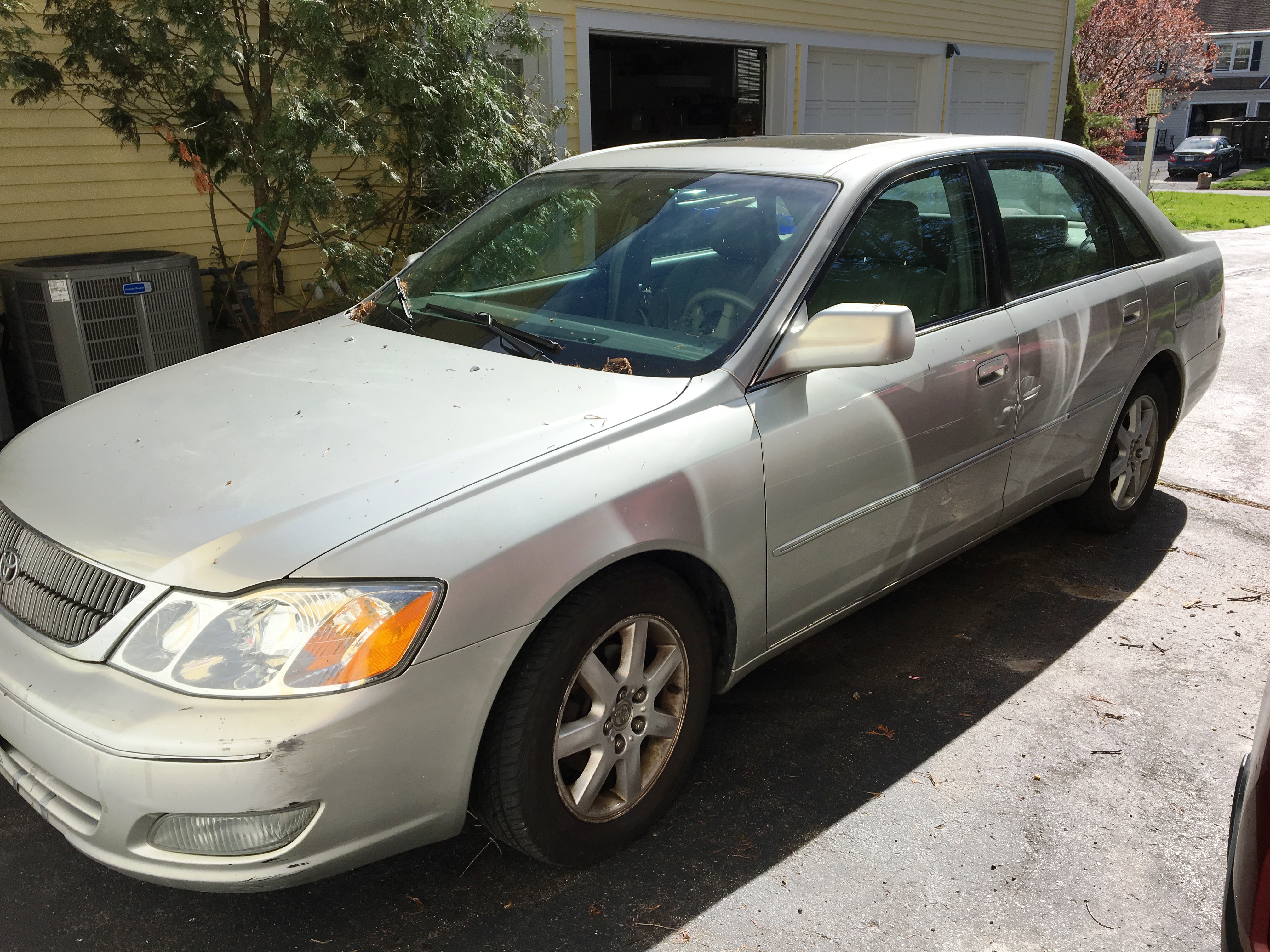 Yet I was mildly hurt (or maybe even more than mildly) when I admitted to a friend last week that I knew she was
uncomfortable whenever I pick her up in my old car, and she countered, “I have no issue with your car being old. It’s
just that it's always a mess.” Ouch! So maybe,
all things considered, it was time, as I said, to move forward. Move
on. But not having purchased a new car in over 15 years, I had no clue where to begin. No,
wait. Scratch that. Maybe I did, after all.
After driving a car for
15 years, very comfortably and without any significant issues, why would I even consider buying a different model?
Even if I was finally ready it trade it in, it’s
not as if I could care less about status and would have any interest in trading up.  So I checked the latest car issue of Consumer Reports, discovered
that Toyota Avalons were still highly rated for safety, reliability,
and trade-in value, and decided to buy another one. This time, though, I would get a hybrid version. Talk about trading up.
I even checked the colors it came in now and picked out an attractive silvery-gold
shade known as Crème Brulee, after one of my favorite desserts. Talk about tempting!
So imagine my amazement when the first dealership I walked into (and it was a nice Jewish one, at that) had a hybrid Crème Brulee Toyota Avalon out on the floor, and because it was a 2016 model, although new, it came with a whopping $3,250 rebate. I took it out for a test drive. I loved it. To me, it offered the best of both
worlds: high miles per gallon (40!), along with a comforting sense of familiarity – minus the mess. It may be ridiculous that I decided to buy the first car I saw in
the first dealership that I entered, but hey – think about it. They had exactly what I wanted. They were the closest place to my house to get it serviced. And what woman enjoys shopping for cars, anyway? As far as I’m concerned, it’s the one item more heinous to shop for than bathing
suits.  The only thing that remained was to settle the terms of sale. Friends told me that
it made the most sense to put as little money down as possible and try to finance the rest.
Well, guess what! Turns out that the 0 percent financing you hear
about on TV is just an urban myth. The lowest rate available, I was told, was just under 3 percent.
I figured that I would at least qualify for that, considering that I pay all of my bills on time, and always have, and that we long ago paid off the
mortgage on our house. Turns out that I figured wrong.
The credit manager at the dealership told me I had only an average
credit rating. That is, an average rating is 690, and mine was 698 on both Experian and Equifax. I couldn’t believe it. How could
that be? Was there some black mark on my record that have been put there purely by mistake? Hardly. According to the credit manager, the problem
was that there was almost nothing in my credit history to base a rating on.
I hadn’t financed my last car, so I had never made a car payment in my life.
Never mind that I paid all of my bills on time. Didn’t have a mortgage. And had no debt.  The only way to raise my credit rating would be to finance something and then pay for it in
a timely fashion. But until I did, the best rate he could give me was 4.5 percent. “So you’re saying that in our society, I get penalized for
being able to pay for stuff!” I said,
half kidding. But the guy grinned broadly in the affirmative. Finally, I understood. I proceeded to have a minor meltdown then and there. Never mind that they had the exact car I
wanted and that it was the only 2016 model
for miles around. Forget the rebate. With a rate that like, I was prepared to walk out, I said. In fact, I almost did. Perplexed to the point of disbelief, the fellow proceeded to hold firm. He couldn’t
override the banks, he said. Besides, the difference
between, say, 4 percent and 4.5 might amount to a measly $6 a month. Never mind that we were talking about 60 months, so even
that paltry sum would come to $360.
To me, it wasn’t about money.  It was more of an issue of principle. I might be willing to drive around in a
15-year-old mess of a car, but I wasn’t
willing to admit to anyone that my credit rating was so modest that I could only wheedle a whopping 4.5 percent interest rate. It was a matter of honor. Finally, after excusing himself to confer with a superior, the credit manager offered to split the difference. I would get a rate of 4.25 percent and pay an extra $3 a month. As compensation, they would
let me put my entire down payment on a credit card, even though their normal limit for this was $3,000 because the “vig,” as he put it, was so high. (Say, what? Was I in a suburban car dealership? Or the Mafia?)  Whatever. We had a deal.
I departed that day with not only a brand new 2016 car, but all the bells and whistles that cars come with now, from Bluetooth, to a screen that assists
me in backing up, to the ability to phone almost anyone I know by verbally
ordering my car to do it for me. Not to mention that my car, one week
later, is still not a mess. It is immaculate. And I intend to keep it that way.
Do I miss my old car? Yes, I guess. But I’m looking forward to all the new places and events to which my new wheels will take me. And so, I would wager, is my dog.  And soon I will begin making those car payments on time, so my credit rating
will have gone up by the time I get around to buying my next car, 15 or so years from now.
So I’m happy. So happy that I can hardly breathe. But at
least I’m moving forward. And forward is the only way to roll.
|